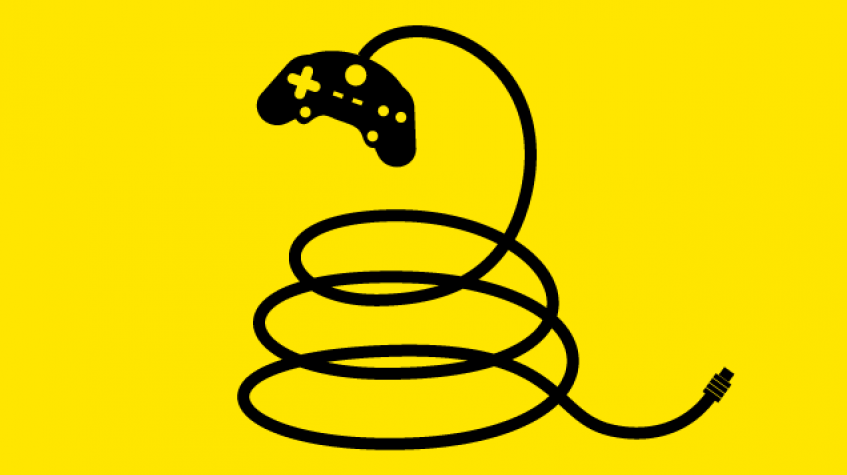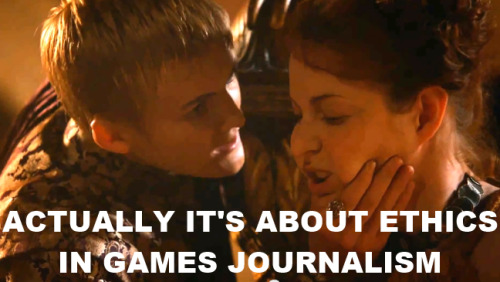
If you pay even slight attention to “games journalism,” you’ve probably heard of the term #GamerGate in the last few months. Every major news outlet has published an editorial denouncing it. It became such a story a few weeks ago that Anita Sarkeesian, the feminist cultural critic behind Tropes vs. Women, was even a guest on The Colbert Report.
http://youtu.be/9L_Wmeg7OTU[width=650,height=366]
Sarkeesian was targeted with a terrorist threat at a speaking gig in Utah and was forced to cancel when university officials refused to screen for weapons under the state’s concealed carry laws.
What’s been discussed heavily is all the #GamerGate anti-women stuff. Vocal, prominent women in and out of the games industry have been threatened, forced to leave their homes over safety concerns and had their personal information leaked online (This charming trend is referred to as “doxxing”). These attacks are attributed to #GamerGate (Even though they don’t necessarily hoist that banner when they’re carried out) because the people behind #GamerGate largely advertise their problems with strong, female voices in the games industry trying to shine a light on the ways games aren’t terribly welcoming to women. Leigh Alexander, Anita Sarkeesian, Mattie Brice, Jenn Frank, Zoe Quinn, Maddy Myers, Patricia Hernandez and others that try to speak out for inclusiveness in a historically and overwhelmingly male industry have all been disproportionately targeted for being what they refer to as “Social Justice Warriors.”
The Seeds of Sexism
The whole thing was spawned from an attack blog a guy named Eron Gjoni wrote about his ex-girlfriend, Zoe. She’s an indie game developer that is pretty outspoken when it comes to feminist stuff in games and tech. She’s not above making the people she disagrees with angry, so he has more than a few people online that despise her. Those people latched onto the personal chat logs and details published by Gjoni on his blog “The Zoe Report” that claimed she had cheated on him with five other guys, one of whom had written about her game, Depression Quest, for Kotaku.
Using images of the burger chain Five Guys Bugers and Fries and gleefully posting “Five Guys” all over Twitter and various comment threads, the people that dislike Zoe shared nude photos of her, review-bombed Depression Quest (A free game designed to help people cope with serious depression) and shared her physical location among a community of anonymous strangers that hated her and spoke openly about wanting her to die.
The Flag-maker
This is where, oddly, Jayne from the cult sci-fi hit Firefly makes his appearance. Actor Adam Baldwin, who has virtually no connection to or even interest in the games industry, tweeted links to two YouTube videos with the hashtag “#GamerGate.” Baldwin, a hyper-conservative ardent anti-feminist, led this creepy charge against a feminist dev that had her dirty laundry dragged through the street by a jilted lover.

That’s the origin of this movement, so it’s easy to see why people conflate sexism with #GamerGate. To deny that connection is to deny the reality of the situation. #GamerGate is a movement of people that saw private chat logs posted online by some wronged 20-something and took his word as gospel. Those people became irate because a female developer that published a free game to help people cope with depression might have gotten better coverage because she slept with someone. Super-classy. Respectable.
But let’s set all that aside for a moment and examine the other side of this thing.
Ethics in Game Journalism
Born from this quivering morass of bandwagon slut-shaming was a second monster: The Knights of Ethical Game Journalism. The people throwing around the #GamerGate hashtag started denying the existence of any overt harassment and even claimed to be feminists themselves (Shocking that they would use the tag of a fervent anti-feminist, but whatever) started claiming their cause was about ethics in game journalism. Accountability. Responsibility. Ethics.

GamerGate, as much as they can be considered a unified front, has made claims that the world of game writing is far too close to the game developers they cover. They assert that money changes hands to alter the perception of a game in the media to manipulate consumers. They cherry-pick details out of context and make every little transgression against their outsider view of what ethics should (and must) be out to be a world-ending terrorist attack against their precious, precious games.
Instead of trying to present their points logically and engaging in a reasoned discussion, they assembled a number of different enemies lists and said to their anonymous army of followers, “These are the people that have wronged you. These are the people that want to destroy your way of life. Attack.”
A few things these people don’t seem to grasp:
Video game reviews are not objective, every review of media is an opinion piece.
Game websites are free to publish whatever they think their readers want to read.
If you don’t want to read what has been written, your greatest weapon as a consumer of media is to not read it.
Contributing to a Kickstarter or Patreon is a way of purchasing content, like buying a game at Best Buy. It is not an inherent conflict of interest.
Likewise, receiving a free copy of a game from a publisher is not a conflict of interest. Reviewers want to provide their opinion in a timely manner and publishers want coverage of their games. It’s a mutually beneficial arrangement that only serves to provide timely coverage for readers.
Nobody. Owes. You. Anything.
It’s All About Entitlement
Recently, the makers of the game Monument Valley released a set of new chapters. The game is a great little indie artsy puzzle game. It’s a little short, but it’s gorgeous. The new chapters are $1.99. Because they put a pricetag on it and didn’t just give it away, the game was given hundreds of one-star reviews, dropping it’s rating in the app store. These reviews came from people that enjoyed the game and wanted more, but didn’t want to pay. They thought they were owed more content, even though no promises were made to provide more.

All this #GamerGate nonsense is rooted in that same entitlement. I don’t want to see someone calling into question the gender politics of a thing I like, so they shouldn’t be allowed to speak. I want to see my media cover some specific story that isn’t being written about, so they should be forced to write it. A person in a disadvantaged group is asking to be treated the way people in the majority get treated and I don’t want to see anything change, that person should be publicly shamed and called names.
If you dislike something, disengage. There is no righteous cause here. There is no war to fight. If you only want to see your own views reflected back at you, open a text file and start typing. Start your own thing, it’s not hard. Having an alternate opinion of something doesn’t make you a villain. Trying to cajole others into behaving how you want them to behave does, especially when how they’re behaving hurts exactly zero people.

Just to be clear, this is not contained to the #GamerGate ‘movement.’ Both the people that fly the flag and the ones that fight against it are guilty of going out of their way to be offended by things, taking things out of context to make people look tremendously bad and generally seeming incapable of just looking away from the things they don’t particularly like.
It’s pointless, entitled whining on all sides and it needs to stop. Games journalism is fine. If you disagree, make your own. You aren’t owed a better class of journalism, especially when that is a vague, moving target being demanded by an angry, anonymous mob.
Play your games, be cool, or go away.

